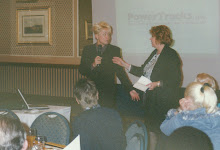I’m wondering what has changed in the last 22 years. A new survey by The Conference Board (www.conference-board.org) found that only 45% of us are happy with our jobs. This is down 16% since their first survey in 1987. But wait. A 2005 survey by the same firm shows these recent stats to represent only a 5% decline in job satisfaction (U.S. Job Satisfaction Keeps Falling) during the past 5 years – and we’ve had a tough economy to deal with.
What I found very interesting is that The Conference Board’s 2005 report cited rapid advancements in technology and employees’ changing expectations as the culprits behind the 2005 results. In their 2009 survey, the why-and-wherefores of the decrease are a bit more vague with John Gibbons, program director of employee engagement research and services at The Conference Board, stating: “Challenging and meaningful work is vitally important to engaging American workers.” This, I presume, means more workers are not finding their work meaningful or challenging, hence the dissatisfaction. Sounds a bit like the rationale behind the decline in job satisfaction for their 2005 survey.
In this era of amazing technological creations, new ways to produce and distribute goods and services, and nearly every company in the world competing on a global basis, it just doesn’t make sense that workers are not “feeling” challenged. (I will get to “meaningful” work in a minute.) More than at any time in history, organizations are challenged. In fact, there are so many challenges and threats it is a wonder most of ‘em just don’t shut the doors. So, how can it be that workers don’t feel any challenge in their work?
Here’s what I think is the answer: The workforce is simply not up to the challenge of solving problems.
In the old days, machines needed to be invented to do work that was being done by human hand or animal (read: printing presses, cotton gin, automobile, telephone, assembly line, locomotive, and so on). Once they were created, someone needed to figure out how to get it out to the masses. No viral videos, tweets, or Facebook testimonials to help spread the word; just a legion of people, going from place to place, in an attempt to sell their products.
Contrast this with Lauren Luke, the 27 year-old single mum from Britain whose YouTube make-up application instruction video that received 4.1 million hits granted her instant fame and her own cosmetic line. Were we without the Internet, it probably would have taken her as much time to launch her cosmetic line as it did Max Factor to get his brand off the ground and running. (In case you were wondering, it took Max Factor 16+ years to launch his cosmetic line, from his first sale at the World’s Fair in St. Louis in 1904 to launching his brand in the 1920’s.)
No, the difference today is that, as a workforce, we just don’t know how to solve problems. We rely on someone or something else to do the thinking, marketing, and selling for us. When those things fail us, instead of rolling up our shirt sleeves and finding ways to solve the problem, we point the finger at others. On the flipside, we are also “helicopter” parents and prevent our children from learning from their own mistakes. We guide, cajole, and coddle them until they are completely bereft of any critical thinking or problem-solving skills. We then turn them out into the workforce and expect them to excel in a world that needs critical thinkers and problem-solvers. Come on, people.
As for not having meaningful work – well, that one is also on you. If what you want is meaning in your work, you need to find work that means something to you. Trust me that the work an organization does mean something to its owner, shareholders, or Board of Directors. If your company's work doesn’t hold any meaning for you, find some place that does. End of your dissatisfaction.
Executive Onboarding Note: The Importance Of The Confidence To Be Open To
Help
-
While executive onboarding, get help. If it’s offered, take it. If it’s not
offered, find it.
The post Executive Onboarding Note: The Importance Of The C...
7 years ago




No comments:
Post a Comment